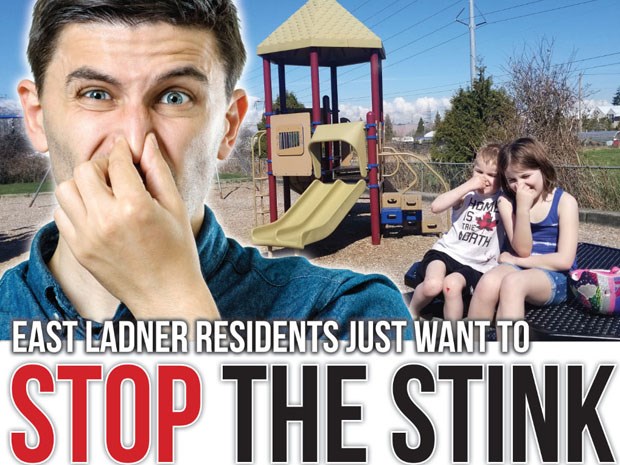The residents of East Ladner are not taking it on the nose anymore.
Fed up with battling putrid odours from the Green for Life/Enviro-Smart food and garden waste composting facility on 72nd Street, nearby homeowners are ramping up their campaign to finally stop the stink.
In recent months, the website Ourladner.net was created to enhance the Stop the Stink campaign and residents continue their social media blitz to draw public awareness to an issue that has negatively impacted the area for more than a decade.
Spokesperson for the Stop the Stink campaign, East Ladner resident Peggy Richardson says the smell is only a symptom of a larger problem that began back in 2004.
Richardson says their quality of life has been impacted as residents have been unable to enjoy their backyards, open windows or invite others to their homes. Property values have also been hit by the obnoxious odour, she says.
“There is a distinct difference between normal farm smells and the putrid smell emanating from the recycling of food and garden waste at this facility,” says Richardson. “The residents of East Ladner remain steadfast in their pursuit of clean air.”
Richardson says residents agree that composting is good for the earth as long as it’s done in a responsible way that does not do further environmental damage or create a nuisance or possible health risk.
“In our research, however, we've noted a historical lack of government interest in actually enforcing the not insignificant environmental laws we already have,” she says. “We all agree that composting is very important in that it recycles organic matter and nutrients, allowing them to be returned to the soil. If done correctly, we should expect minimal odour during the composting process.”
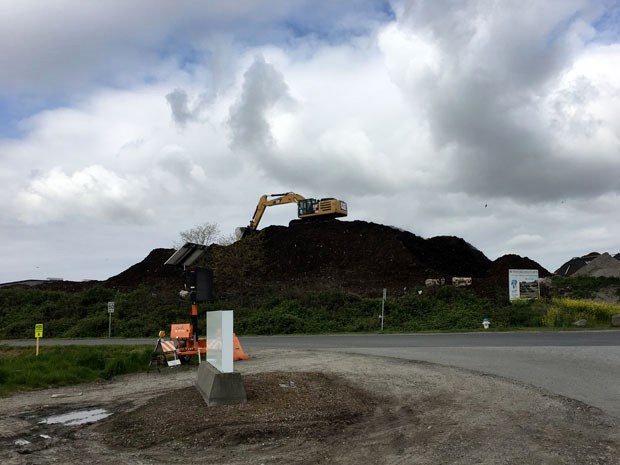
Air quality permit
The previous owner of the facility was advised to obtain an air quality permit in 2007 and specifically requested to do so by Metro Vancouver in 2013.
For reasons unknown to residents, the City of Delta did not require an air quality permit when it renewed its service agreement with Enviro-Smart for taking residential food waste in 2016 just before the operation was sold to GFL.
As the smells increased in the summer of 2016 and into 2017, so too did the complaints with calls in the hundreds to Metro Vancouver as well as calls, emails and letters demanding action from city hall.
After several public information meetings held by Metro Vancouver as well as one by GFL, Metro began the process of issuing an air quality permit that was finally granted to GFL last August.
When the permit was granted, many in East Ladner filed appeals to the Environmental Appeal Board, arguing the permit does not adequately protect residents from air pollutants. GFL also appealed the permit on the grounds it is too strict and not financially advantageous.
The Optimist requested comment from GFL, but a company spokesperson declined interview requests.
“In light of how close we are to the hearing related to our appeal of the air permit we are not doing interviews,” Jennifer Ahluwalia, GFL’s vice president of environmental responsibility and sustainability, stated in an email to the Optimist.
Richardson says air contaminants from facilities such as Enviro-Smart are an issue in many jurisdictions where business interests conflict with the safe environment needs of local citizens.
“In the Enviro-Smart situation, the current air quality permit issued is weak in keeping GFL accountable for how it pollutes the air, and when,” she says. “For example, potential odour releases during the outdoor curing, storage and screening are not adequately addressed in the permit. Further, requirements for the proposed facility are not adequately defined.”
The Environmental Appeal Board hearings will be held June 3 to 18 and June 26 to 28 at the Coast Tsawwassen Inn.
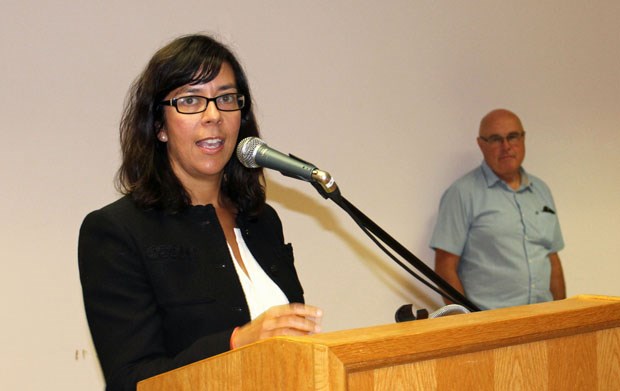
Enclosed facility
Issuance of the air quality permit requires GFL to enclose its facility by March 1, 2020.
GFL has submitted a building permit application to Delta for a 137,326-square-foot composting building operated under negative air pressure connected to a 30,000-square-foot biofilter. In addition, a 10,297-square-foot connector building would be added to the existing composting building as part of the modifications to fully enclose and connect the current buildings to the new biofilter.
Delta has requested an update from GFL on its construction plans, but had yet to hear back from the company as of mid-May.
City manager Sean McGill says despite opposition from residents, Delta absolutely believes that enclosing the facility is the quickest and most efficient way to address the stench.
“We clearly need to do something better and that is enclosing the facility,” says McGill. “I understand that we have had some differences of opinion on this as well as the appeal process and how that might be addressed, but we have always been upfront in that we recognize and understand the residents’ concerns. There was a point when they [GFL] could not clearly manage this as an outdoor facility, so we need to enclose this.”
Richardson and others, however, are not convinced.
“There is no guarantee that an enclosure will eliminate the stink,” she says. “There has to be something done that will guarantee that there will be no more smells. We just don’t have any confidence in GFL and what they have said to us.”
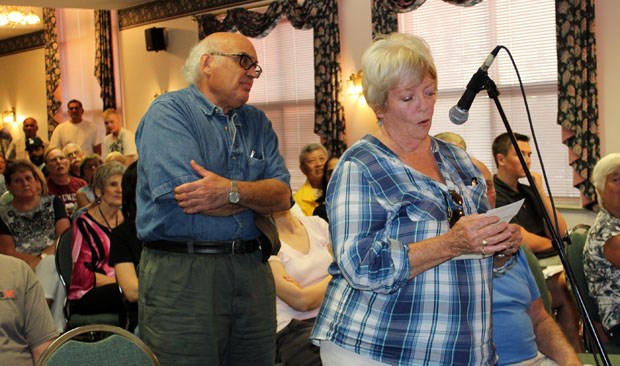
Increase in tonnage
The air quality permit is only one of several concerns for residents. There is the issue of noise emanating from the facility at all hours, truck traffic and the possibility of an increase in tonnage.
“Now that Harvest Power is shutting down in Richmond, where is all of that material going to end up?” asks Richardson. “Will it be GFL? We don’t know, but if it does and if there is more material, based on formulas for volume in and volume out, there is a big possibility that they will need more farmland, so that’s just adding to an already bigger problem.”
McGill says Delta has a veto on tonnage if GFL does ask for an increase.
“Staff and council have always been concerned about the process that Metro Vancouver took when they said that they were banning organics from the waste stream,” says McGill. “Metro didn’t put in place any facilities to accommodate for that and then you have these private facilities that come in and you end up where we are at now. GFL have come in the past and asked for an increase in tonnage and council has denied that. By this veto we can control tonnage, trucks and the materials that the facility can handle.”
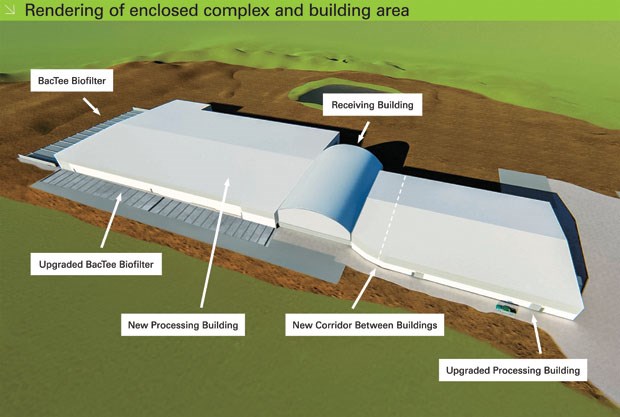
Compliance of farmland usage
While the Environmental Appeal Board hearing in June deals with the air quality permit, the Agricultural Land Commission deals with the compliance of farmland usage.
According to ALC CEO Kim Groat, because the site is on the Agricultural Land Reserve, GFL must use 50 per cent of its finished product on farmland.
Groat adds the facility does comply with ALC regulations.
“From our perspective, the ALC is the regulator,” says McGill. “I think people forget that Delta reached out to them [ALC] and said here are our concerns and they came back and said that Enviro-Smart is in compliance. We can only deal within the legislation or the regulations that we have and a very big piece of this process was understanding where the ALC was on this issue.”
Delta South MLA Ian Paton has written letters on behalf of residents to the ALC and the Ministry of Environment as well as had several meetings with ministry staff and the minister. He says he sympathizes with the residents and what they’ve had to endure.
“Because it is a farm and it is in the ALR, composting and storage is allowed so they are complaining with the rules that are in place,” says Paton. “I know this is not what residents want to hear, and as much as people are upset, the best thing that could happen is GFL investing $23 million for the total enclosure. I think that is the best anyone can ask for.”
Despite what the ALC says, residents still feel that Delta, Metro Vancouver and the province are more interested in protecting GFL than their own residents.
“Why does it appear that the ALC stands idly by when it seems intuitively obvious that there is far too much compost being produced than can be utilized by the crops growing on this farm? Why is there not adequate oversight by the ALC, the Ministry of Environment, the City of Delta or Metro Vancouver? When does an international waste management facility become a farm?” asks Richardson.
“I know that government works slowly, but all these years that we have been dealing with this, this is less than a snail’s pace. Do we feel let down? Yes, absolutely.”
